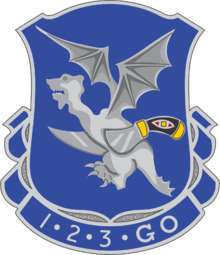123rd Infantry Regiment (United States)
| 123rd Infantry Regiment | |
|---|---|

Coat of arms
|
|
| Active | 1862-1865, 1917-1919, 1942-1946 |
| Country |
|
| Allegiance | Illinois |
| Branch | Illinois Army National Guard |
| Type | Infantry |
| Motto(s) | 1, 2, 3 Go! |
| Engagements |
|
| Insignia | |
| Distinctive unit insignia | |
| U.S. Infantry Regiments | |
|---|---|
| Previous | Next |
| 122nd Infantry Regiment | 124th Infantry Regiment |
The 123rd Infantry Regiment was an infantry regiment of the United States Army. It was a component of the Illinois Army National Guard and can trace its roots back to the American Civil War. It later fought in World War II where it received acclaim for its jungle fighting against the Japanese in the Pacific Theater.
The 123rd Illinois Volunteer Infantry Regiment was part of the John T. Wilder's "Lightning Brigade" during the Civil War. The Regiment was organized at Mattoon, Illinois, by COL James Monroe (then a Major of the 7th Illinois Volunteer Infantry Regiment). Companies A, C, D, H, I and K being from Coles County; B from Cumberland, County, E from Clark County, F and G from Clark and Crawford County. It was mustered into service on 6 September 1862, with COL James Monroe as the regimental commander, LTC Jonathan Biggs as the executive officer, and MAJ James A. Connolly, of Charleston, Illinois, as third-in-command. On the 19 September 1862, the Regiment was loaded into freight cars at Mattoon, and transported to Louisville, Kentucky, where it was at once put to work, under Major General William "Bull" Nelson, to fortify the city against Confederate General Braxton Bragg, who was then advancing on it in pursuit of Union General Don Carlos Buell. On 1 October , having been assigned to the Thirty-third Brigade (General William R. Terrill), Fourth Division (General James S. Jackson), in McCook's Corps, the regiment started on the march under Buell, southward through Kentucky, after Bragg, who had turned back, and up to this time the regiment never had battalion drill, and hardly an attempt at company drill, as all the officers, except the colonel, were "raw recruits".
...
Wikipedia

